Martin Edwards's Blog, page 158
August 3, 2016
Kidnapping Freddy Heineken - film review
Kidnapping Freddy Heineken is a film from last year which didn't refresh the parts of cinema audiences that other movies fail to reach. Received with some indifference, it soon made its way on to television, where I watched it recently. In fact, it's not by any means a bad film, though it is lacking in high quality - despite the presence in the cast of the great Anthony Hopkins,who plays the eponymous beer tycoon and kidnap victim with his customary verve.
The film is based on real life events which took place in Amsterdam in the early 80s. A bunch of five incompetent-seeming young men have run into financial trouble, and the banks refuse to bail out their failing business. An attempt to drive some squatting punks out of their company property is crudely and ineptly handled, and so the quintet need to find some other way to make ends meet.
The solution they come up with is to kidnap Freddy Heineken, and demand a multi-million ransom. Their ineptitude is such that it comes as a surprise when they manage to pull off the crime - also kidnapping the tycoon's chauffeur. The police struggle to make progress, but things start to go wrong when the villains become anxious about a delay in obtaining the ransom.
Jim Sturgess and Sam Worthington are the two principal conspirators. However, a major problem with the film is that we never really empathise with the kidnappers - in fact, the other three are ciphers. If the action were sufficiently compelling, this flaw in the screenplay might not matter too much, but overall, I felt that script did not live up to the potential of the premise. Kidnapping is a crime that engages the emotions, but the screenwriter never managed to capture this. So although the film is quite well made, I can understand why it didn't achieve success at the box office.
The film is based on real life events which took place in Amsterdam in the early 80s. A bunch of five incompetent-seeming young men have run into financial trouble, and the banks refuse to bail out their failing business. An attempt to drive some squatting punks out of their company property is crudely and ineptly handled, and so the quintet need to find some other way to make ends meet.
The solution they come up with is to kidnap Freddy Heineken, and demand a multi-million ransom. Their ineptitude is such that it comes as a surprise when they manage to pull off the crime - also kidnapping the tycoon's chauffeur. The police struggle to make progress, but things start to go wrong when the villains become anxious about a delay in obtaining the ransom.
Jim Sturgess and Sam Worthington are the two principal conspirators. However, a major problem with the film is that we never really empathise with the kidnappers - in fact, the other three are ciphers. If the action were sufficiently compelling, this flaw in the screenplay might not matter too much, but overall, I felt that script did not live up to the potential of the premise. Kidnapping is a crime that engages the emotions, but the screenwriter never managed to capture this. So although the film is quite well made, I can understand why it didn't achieve success at the box office.
Published on August 03, 2016 03:00
August 1, 2016
The Passenger - DVD review
Although, as a schoolboy, I watched several Francis Durbridge serials on television, I missed The Passenger, which was screened in 1971. I've now caught up with it belatedly thanks to a Pidax DVD. It's a German enterprise - (Durbridge was always very popular in Germany) but there's an English language option. And the first thing to say is that this is a very enjoyable example of Durbridge at the top of his form.
In the first of the three episodes, we're introduced to David Walker (played by David Knight) and his business partner Arthur Eastwood (that reliable character actor Arthur Pentelow). They are contemplating a sale of their business, but when Walker goes home early, he catches his wife in bed with her driving instructor. He walks out, and decides to head north. While driving, he gives a lift to a pretty young woman called Judy. She disappears mysteriously, and is soon found dead. Walker duly becomes the prime suspect.
I liked the way Durbridge switched the suspicion around from one character to another. DI Martin Desnon, played by that very consistent and appealing actor Peter Barkworth, leads the hunt for the killer, and his estranged wife Sue (Joanna Dunham), who worked for Walker's company, plays a key part in events, especially after Walker dies, apparently having committed suicide in a fit of remorse over Judy's murder.
I thought I'd figured out the solution to the mystery, but Durbridge had other ideas. I must say that I'm quite attached to my solution, while I thought his left one or two loose threads! Never mind. I really enjoyed this one. There are also some good bonus features, such as an interview with Durbridge's son. If you are a Durbridge fan, this is a must-buy.
In the first of the three episodes, we're introduced to David Walker (played by David Knight) and his business partner Arthur Eastwood (that reliable character actor Arthur Pentelow). They are contemplating a sale of their business, but when Walker goes home early, he catches his wife in bed with her driving instructor. He walks out, and decides to head north. While driving, he gives a lift to a pretty young woman called Judy. She disappears mysteriously, and is soon found dead. Walker duly becomes the prime suspect.
I liked the way Durbridge switched the suspicion around from one character to another. DI Martin Desnon, played by that very consistent and appealing actor Peter Barkworth, leads the hunt for the killer, and his estranged wife Sue (Joanna Dunham), who worked for Walker's company, plays a key part in events, especially after Walker dies, apparently having committed suicide in a fit of remorse over Judy's murder.
I thought I'd figured out the solution to the mystery, but Durbridge had other ideas. I must say that I'm quite attached to my solution, while I thought his left one or two loose threads! Never mind. I really enjoyed this one. There are also some good bonus features, such as an interview with Durbridge's son. If you are a Durbridge fan, this is a must-buy.
Published on August 01, 2016 01:58
July 29, 2016
Forgotten Book - The Davidson Case
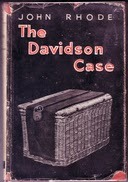
Today's Forgotten Book dates from 1929, and is an early case featuring Dr Priestley, John Rhode's cerebral and rather curmudgeonly Great Detective. The Davidson Case is an enjoyable mystery. I figured out the culprit's secret at a fairly early stage, but that didn't spoil the book for me, which strikes me as one of the best Rhodes I've read to date. (He also wrote as Cecil Waye and as Miles Burton, and two Burtons have been chosen for inclusion in the British Library's series of Crime Classics.)
The book has a background in business, something that was - perhaps surprisingly - quite common in Golden Age stories, especially those written by people like Rhode and Freeman Wills Crofts, who had extensive business experience. Guy Davidson's unpleasant cousin, Sir Hector, has taken charge of the family firm, and his behaviour - which includes getting rid of a senior employee called Lowry - is causing Guy concern. Sir Hector seems unstoppable, but when he is found dead after a train journey, Guy is able to take control of the company, and order seems to have been restored.
Until, that is, the police start to suspect Guy of having murdered Sir Hector. Priestley assists the police, but finds some aspects of the case troubling, and refuses to testify in court. Rhode offers a pleasing sequence of plot twists, and "justice" is mentioned in the very last sentence, a reminder of the extent to which notions of justify preoccupied Golden Age writers. I found the story held my attention from start to finish.
One line I enjoyed particularly came when Priestley and his secretary Harold pursue their investigations into Guy's activities. "Really, my boy," the great sleuth says, "the public house is the finest possible place in which to obtain information" There speaks Rhode, a pub-lover who enjoyed a pint or three (one can't quite imagine Poirot saying something similar to Hastings, can one?) A good book, well worth a read.
Published on July 29, 2016 04:31
July 28, 2016
Golden Moments
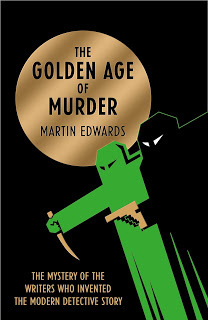
The Golden Age of Murder has today featured in the shortlist for the CWA Gold Dagger for Non-Fiction. Another moment to savour in what really has been a wonderful year so far. My fiction has appeared in three CWA Dagger shortlists over the years, and "The Bookbinder's Apprentice" went on to win the Short Story Dagger, but this is the first time my non-fiction has been so honoured. Suffice to say that, given the book has won three awards and now been shortlisted for three others, it is undoubtedly the luckiest of all my many writings.
I see myself first and foremost as a writer of fiction, but I've always loved reading and writing non-fiction, and I published several non-fiction books and many articles before my first novel and short story appeared in print - a quarter of a century ago (yep, I began young!)
It's easy to under-estimate non-fiction, and unfortunately there are still people out there who do just that .Yet in the age of the internet, when so much material is available for free, it's quite something to get a non-fiction book published, let alone widely recognised. My warmest congratulations go to the authors of the other books on the shortlist.
The CWA Gold Dagger for Non-Fiction has an illustrious history. It was first awarded back in 1978 for Audrey Williamson's The Mystery of the Princes, a book I hope to write about here before too long, and there are some real classics to be found in the list of former winners. But no book about the genre - as opposed to books focusing solely on true crime - has ever won the Dagger. Will this year be an exception? Who knows? The answer will be revealed in October.
Published on July 28, 2016 06:38
July 27, 2016
Cricket and Crime
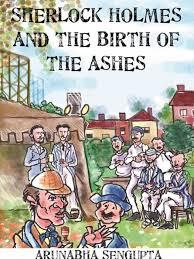
Cricket is my favourite sport, even ahead of football, and I'm quite sure that no other sport has a comparably impressive literature. There are plentiful connections between cricket and crime fiction - Lord Peter Wimsey's cricketing feats in Murder Must Advertise and the Ted Dexter/Clifford Makins thriller Testkill are just the tip of the iceberg.
J.Jefferson Farjeon, for instance, was a keen cricket fan (he wrote an intro to a cricket book by his brother Herbert) and cricket features recurrently in his crime fiction. This feature of his work is highlighted in an insightful piece about Thirteen Guests in Cricket County
The author of that article, Arunabha Sengupta, is also the author of the recently published, Sherlock Holmes and the Birth of the Ashes, published by Maxbooks, which begins, rather wittily I think, "To Sherlock Holmes, it was always the match".. It's a snappy, well-researched,story, and the humour is a bonus. I should also mention briefly a book I've just received but not had time to read, The Rules of Backyard Cricket by Australia's Jock Serong (Text Publishng), which is described as being in the tradition of Peter Temple.
Finally, and with no connection to crime - except that if you are a cricket fan it would be a crime to miss it! - I'd like to mention In Their Own Words, by Steve Dolman, aka blogger Peakfan (Pitch Publishing). The book gathers together interviews with Derbyshire cricketers over the years, including several of my boyhood heroes, such as Harold Rhodes the most successful wicket-keeper in history, Bob Taylor. and Peter Gibbs, author of that wonderfully entertaining novel Settling the Score. I found it absolutely riveting, and I'll treasure my copy, signed by several of those heroes. And even if you're not a cricket fan, the insight into the everyday lives of county cricketers, especially in the twenty five years or so after the Second World War, is full of interest.
Published on July 27, 2016 05:35
July 25, 2016
Festival Time

It's a sign of just how good a time I had at the Harrogate Crime Festival this past week-end that on Friday I completely forgot to post the Forgotten Book piece that I'd written in advance of my trip. Ooops. It will now appear this coming Friday instead! But I really did have a good time at Harrogate, which was looking at its best in the sun. It's a lovely setting for a festival.
I very much enjoyed catching up at length with James, my agent, and discussing with him a wide variety of projects that are in the pipeline for the next twelve months. We also had the chance to reflect on all that has happened in my writing career over the past year - it's been the most exciting time of my writing life. I was also able to give him an update on my latest novel-in-progress. My fiction writing has inevitably taken a back seat lately, but I'm totally committed to it, and although the new novel won't be ready for publication in 2017, it is at least moving forward. Next year will, though, see the publication of The Story of Classic Crime in 100 Books and several anthologies that I've edited.
I had the pleasure of meeting Karen Robinson of the Sunday Times Crime Club for the first time, and of attending parties held by Harper Collins and Bonnier. For the annual quiz masterminded by Val McDermid and Mark Billingham, I was invited to join the Little, Brown team, which also included Stav Sherez, and we came second - not quite top of the pile, but still a good result and a very enjoyable evening.
There was also the chance to have dinner with the likes of Barry Forshaw and David Stuart Davies, as well as catching up with a whole host of old friends, such as Ali Karim Alison Joseph and Leigh Russell, all of whom are pictured above outside the Old Swan Hotel, Ricki Thomas, Felix Francis, and many more. The fact the hotel was the place to which Agatha Christie retreated during her notorious disappearance does give the festival an added piquancy. Harrogate's a different sort of event from those wonderful week-ends Crimefest and St Hilda's (I'm very much looking forward to the latter, in mid-August) but has a distinctive atmosphere. And the fantastic weather was a bonus..
Published on July 25, 2016 04:48
July 20, 2016
Spooks: The Greater Good - film review
I've managed somehow never to be drawn into the long-running hit TV spy show Spooks. I say 'somehow', but in fact what happened is that I missed the first couple of series, and then felt disinclined to try to catch up. So when the film released last year based on the show, rather clumsily titled Spooks: the Greater Good turned up on the schedules, I decided to watch it to see what the fuss is about.
It's often the case that, when a popular TV show is adapted for the big screen, things go awry. This is especially disappointing for those who have long been fans of the series. I wondered if the fact I'd not seen the series would be a disadvantage or, alternatively, give me the chance to assess it without preconceptions. As things turned out, I'd say it wasn't really a disadvantage not to have seen the series on TV. Did I enjoy the film? Yes, certainly.
It begins in a blaze of action as terrorist Qasim is helped to escape from custody by armed terrorists in a shoot-out. Has a mole assisted Qasim? Peter Firth, playing top spy Sir Harry Pearce, thinks so. He's the fall-guy for the disaster, and he responds by faking his own suicide. What is he up to? Among those wanting to find out are the Director General of the Secret Service, played by Tim McInnerny, and his deputy, Geraldine, played with icy calm by Jennifer Ehle. Suffice to say that I thought McInnerny's performance was a hundred times better than it was in Houdini & Doyle.
Among those who become embroiled in Pearce's cunning plans is the brilliant Tuppence Middleton, once again demonstrating her versatility as an actor. The plot complications come thick and fast, and this is not a story that has quite the relentless grip of The Night Manager,because there is less space for characterisation. But it's an enjoyable action thriller. I'd be interested to know how fans of the TV show rate it.
It's often the case that, when a popular TV show is adapted for the big screen, things go awry. This is especially disappointing for those who have long been fans of the series. I wondered if the fact I'd not seen the series would be a disadvantage or, alternatively, give me the chance to assess it without preconceptions. As things turned out, I'd say it wasn't really a disadvantage not to have seen the series on TV. Did I enjoy the film? Yes, certainly.
It begins in a blaze of action as terrorist Qasim is helped to escape from custody by armed terrorists in a shoot-out. Has a mole assisted Qasim? Peter Firth, playing top spy Sir Harry Pearce, thinks so. He's the fall-guy for the disaster, and he responds by faking his own suicide. What is he up to? Among those wanting to find out are the Director General of the Secret Service, played by Tim McInnerny, and his deputy, Geraldine, played with icy calm by Jennifer Ehle. Suffice to say that I thought McInnerny's performance was a hundred times better than it was in Houdini & Doyle.
Among those who become embroiled in Pearce's cunning plans is the brilliant Tuppence Middleton, once again demonstrating her versatility as an actor. The plot complications come thick and fast, and this is not a story that has quite the relentless grip of The Night Manager,because there is less space for characterisation. But it's an enjoyable action thriller. I'd be interested to know how fans of the TV show rate it.
Published on July 20, 2016 14:32
Motives for Murder - a new Detection Club book
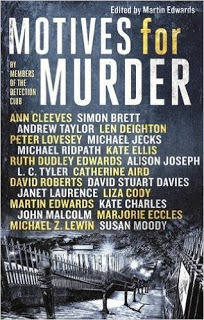
I'm delighted to announce that the Detection Club will publish in November a brand new collection of short stories, Motives for Murder. The idea is to celebrate the 80th birthday this year of one of the Club's most distinguished members, Peter Lovesey. The book will be published in Britain as a paperback original by Little, Brown, Peter's publishers, and in the US (with a limited hardback edition as well) by Crippen & Landru, a small press run by Peter's good friend Doug Greene.
Setting the wheels in motion for this book was my first act as President of the Detection Club. I wanted to honour Peter, who has given so much to the Club over many years (and has, incidentally, been a great source of information about its past) and I also wanted to showcase the short story writing talents of our wonderful members. The Club's membership is relatively small, and the deadline was exceptionally tight, but more than a third of those members offered to contribute to the book, which delighted me. The result is a very substantial anthology indeed;.
The book benefits from a foreword by the legendary Len Deighton. Len has published very little over the past twenty years, so I was thrilled when he agreed to get things rolling, and there is also a fascinating afterword by Peter himself, which includes many stories about his early days in the Detection Club back in the 70s.
Each of the twenty stories (well, nineteen stories and one sonnet!) was written specially for the book, and each is prefaced by a few words from the author about Peter's contribution to the genre. There are some wonderful things in this book, written by leading crime writers such as Ann Cleeves, Andrew Taylor, Len Tyler, Michael Ridpath, Liza Cody and...well, the list goes on. I'm thrlled that we've put together such a special book in a very short space of time and hope that crime fans everywhere will find something in it to delight and entertain
Published on July 20, 2016 04:02
July 19, 2016
Travelling Around the Blogosphere
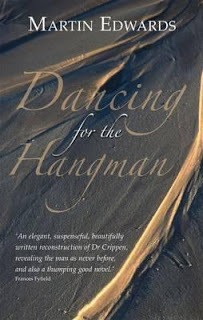
In the past few days, I've been lucky enough to feature, along with my writing on several of the best crime blogs around. Here's a round-up, starting with my visit to Fiction Fan's blog to talk about ten of the best Golden Age detectives. A fun post to write!
I've often said that Dancing for the Hangman, published eight years ago and written a while before that, is a personal favourite of mine, even though it's a history-mystery, very different from all my other novels. I've usually added that, in terms of sales, it is my least successful book; perhaps this is because it was published here and in the US by two small presses. The reviews were terrific, and I was delighted to see that Puzzle Doctor, responsible for a very interesting blog with a leaning towards classic crime, has given the novel a boost with a terrific review today. I'm really pleased about this, because I still believe in Dancing for the Hangman, and I hope to give it fresh life one of these days, not least with an ebook version.
One of my latest short stories, "Consuming Passion", has appeared in the July issue of Ellery Queen's Mystery Magazine, a memorable issue which contains loads of good things, including reflections on the magazine's history of publishing first stories by writers who have gone on to make a name for themselves. I was delighted to read about Keenan Powell's enthusiasm for my story in her Mysteristas blog. Like the review on In Search of the Classic Mystery, this sort of thing is very good for morale (especially as I'm battling with a rather tricky story right now...)
And finally, Puzzle Doctor hosted an interview with me in connection with the Cluff books published by the British Library. I'm grateful to him, to Fiction Fan, and to Keenan for giving me this attention.
Published on July 19, 2016 02:50
July 17, 2016
The Secret Agent - BBC 1 TV review
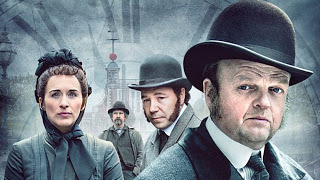
The Secret Agent, starring Toby Jones and based on Joseph Conrad's novel, got off to a fine start on BBC 1 tonight. The book is my favourite work by Conrad (I first encountered him through his short stories, which were a set book for O-Level, but thankfully that didn't put me off). And the TV adaptation is very resonant in these uncertain times, coming to the screen so soon after the horrific events in Nice and all the other terrorist atrocities that have shaken the world in recent months.
It's easy to forget that, even at the time the story was written, it was a historical piece, set in the late 1880s, twenty years before publication. Perhaps this helped Conrad to achieve a sort of perspective on the mixed motives and complex behaviours of those involved with anarchist outrages at the time. Episode one reminded us that the warped thinking that leads people to kill others in pursuit of some vague, or even nonsensical political goal, is nothing new. Conrad tells us something about human nature, and so does Tony Marchant's screenplay.
Jones plays Verloc, who runs a (surprisingly unsuccessful, I'd have thought) sex shop catering for dodgy MPs and vicars in the heart of Soho. He's aided and abetted by his wife Winnie, played by Vicky McClure; she's prepared to turn a blind eye to his behaviour, and the revolutionary claptrap he and his friends spout because, on balance, Verloc is a good husband who takes care of her.
But Verloc is in a mess. He works an agent for the Russian government, who take a hard view of revolutionaries, and also dabbles in work as an informer for Scotland Yard. Fear and financial pressure are leading him into very dangerous territory with a gang of anarchists who are as unstable as the bombs they make. It's gripping, but also chilling. Not exactly good escapism, given the wretched things happening right now in real life, but good television.,
Published on July 17, 2016 14:58



